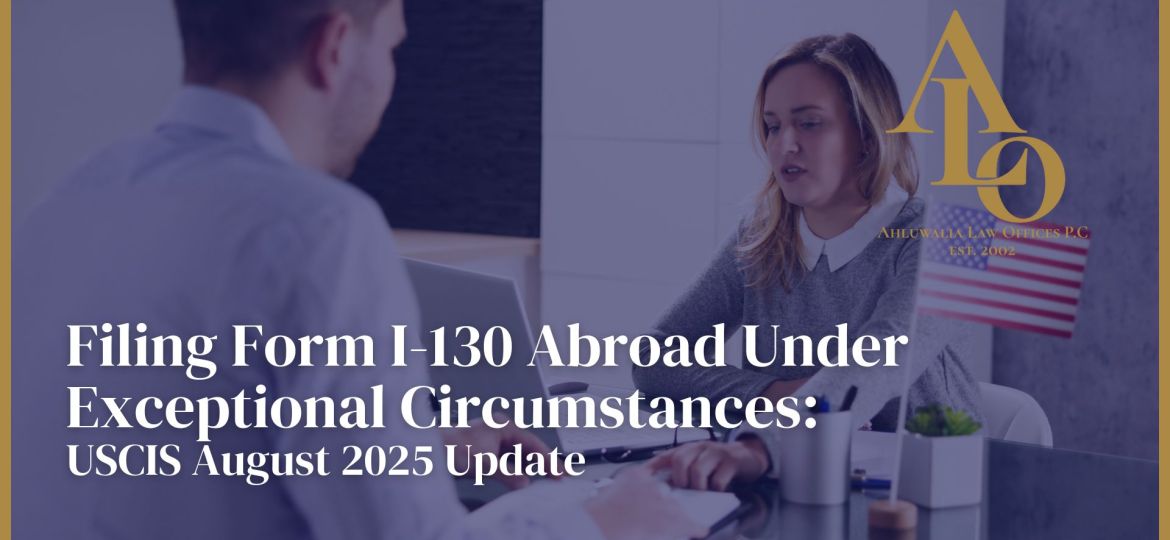
On August 1, 2025, U.S. Citizenship and Immigration Services (USCIS) updated its Policy Manual to clarify when the Department of State (DOS) can accept and adjudicate a consular filing of Form I-130, Petition for Alien Relative, filed abroad by a U.S. citizen. This delegated authority applies only to “clearly approvable” petitions filed under exceptional circumstances or specific blanket authorizations.
This update is particularly relevant for U.S. citizens residing or traveling abroad who require urgent processing of an immediate relative petition and cannot resolve their situation through a standard domestic filing or expedite request.
What Counts as “Exceptional Circumstances”?
The USCIS Policy Manual outlines several situations where consular acceptance may be possible, including:
- Military emergencies – Sudden deployment or transfer of a U.S. citizen service member stationed abroad, without sufficient notice.
- Medical emergencies – Urgent health situations requiring immediate travel.
- Threats to personal safety – Imminent danger from civil unrest, violence, or natural disaster.
- Child aging out – Beneficiary nearing the age limit for eligibility.
- Petitioner recently naturalized – Beneficiary requires a new petition after the petitioner’s change in status.
- Adoption cases – Urgent travel following finalization of an international adoption.
- Short-notice job relocation – Sudden employment reassignment for the petitioner abroad.
These examples are not exhaustive, and DOS may accept other urgent cases if filing domestically would not address the time-sensitive nature of the request.
Blanket Authorizations
Some petitioners do not need to prove exceptional circumstances if they fall under a blanket authorization:
- U.S. military service members stationed at U.S. military bases abroad on official orders.
- U.S. government employees assigned to missions abroad under Chief of Mission authority or at the American Institute in Taiwan.
- Crisis situations – Temporary blanket authorizations for those affected by severe civil strife or natural disasters.
Filing Requirements
- Physical presence – The petitioner must appear in person at the U.S. embassy or consulate to file the petition.
- Jurisdiction – Both petitioner and beneficiary must be in the consular district during processing.
- Post-specific procedures – Each consular post has its own intake process. For example, London requires an online request form before submission, while Australia uses an email pre-approval process.
The “Clearly Approvable” Standard
A petition is considered clearly approvable if it includes sufficient primary evidence of:
- The petitioner’s U.S. citizenship
- The qualifying family relationship with the beneficiary
Incomplete or questionable cases are forwarded to USCIS service centers for standard adjudication.
When Local Filing Is Not Allowed
DOS cannot accept an I-130 abroad when:
- The petitioner is U.S.-based and travels abroad solely to expedite.
- The same beneficiary already has a pending I-130 filed with USCIS.
Practical Considerations
- No guarantee of acceptance – DOS may decline a request even if it appears urgent.
- No appeal rights – Decisions to reject a local filing cannot be appealed or reconsidered.
- Expedite options remain – If local filing is denied, petitioners can still submit domestically and request expedited processing.
Next Steps for U.S. Citizens Abroad
If you believe your situation may qualify as an exceptional circumstance or under a blanket authorization, start by:
- Reviewing the consular post’s specific filing instructions.
- Gathering comprehensive documentation supporting urgency.
- Consulting an immigration attorney to evaluate eligibility and prepare the petition to meet the “clearly approvable” standard.

